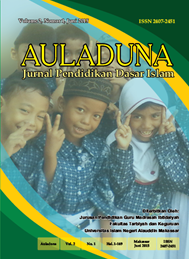TANGGUNG JAWAB GURU MELAKUKAN EVALUASI HASIL BELAJAR: Belajar dari Desain Penyelenggaraan Ujian Nasional Tahun 2008
Abstract
Abstract: This paper aims at describing the role of teachers in evaluating students' learning outcomes. In measuring the achievement of instructional goals, teachers should know the principles and techniques of evaluation, so the results can be scientifically accountable. The evaluation which is done well, will avoid teachers to be subjective in evaluating students' achievements. Conversely, if it is done badly, the evaluation will not show the factual results of students' learning. As a result, learning achievements is difficult to be described.
Abstrak: Tulisan ini bertujuan menggambarkan peran guru dalam pelaksanaan evaluasi hasil belajar. Dalam mengukur capaian tujuan pembelajaran, setiap guru dituntut menguasai prinsip dan teknik evaluasi sehingga hasilnya dapat dipertanggungwabkan secara ilmiah. Evaluasi yang dilakukan dengan baik akan menghindarkan guru untuk subjektif menilai prestasi belajar peserta didik. Sebaliknya, proses evaluasi yang kurang baik tidak akan dapat menggambarkan keadaanya nyata pembelajaran. Akibatnya, hasil belajar sulit untuk digambarkan secara baik.
Downloads
References
Arifin, Anwar, 2003. Memahami Paradigma Baru Pendidikan Na-sional dalam Undang-Undang SISDIKNAS, POKSI VI FPG DPR RI.
Arikunto, Suharsini, 1997. Dasar-dasar Evaluasi Pendidikan, Jakarta: Bumi Aksara.
Dahidi, Ahmad dan Miftachul Amri. 2003. Potret Pendidikan di Jepang, Sebuah Refleksi, Yogyakarta: Pikiran Rakyat.
http://murniramli.wordpress.com/2007/04/13/kurikulum-sma-di-jepang/
http://saniroy.wordpress.com/2006/05/05/cinta-tanah-air-ala-jepang/
http://pakguruonline.pendidikan.net/pradigma_pdd_ms_depan_34. htm.
LCCPTC, “Kegagalan Guru dalam Melakukan Evaluasi Pendidikan”, dalam Media Indonesia On-Line, 16 Januari 2008.
Mulyasa, E., 2005. Menjadi Guru Profesinal, Mencuptakan Pembelajaran Kreatif dan Menyenangkan, Bandung:Remaja Rosdakarya.
Purwanto, Yadi, 2007. Etika Profesi, psikologi Profetik perspektif psikologi Islami, Bandung: PT.Refika Aditama.
Sanjaya, Wina. 2007.. Strategi Pembelajaran (Berorientasi Standar Proses Pendidikan). Jakarta: Kencana.
Sudijono, Anas, 1998. Pengantar Evaluasi Pendidikan, Jakarta: Raja Grafindo Persada.
Usman,Moh. Uzer, 2005. Menjadi Guru professional, edisi kedua, Bandung: Remaja Rosdakarya.
Undang-undang Nomor 23 Tahun 2003. Tentang Otonomi Daerah, Lembaran Negara nomor 60 tahun 1999.
Undang-Undang Nomor 14 Tahun 2005. Tentang Guru dan Dosen.
Authors who publish with AULADUNA: Jurnal Pendidikan Dasar Islam agree to the following terms: Authors retain the copyright and grant Universitas Islam Negeri Alauddin Makassar right of first publication with the work simultaneously licensed under a Creative Commons Attribution License (CC BY-SA 4.0) that allows others to share (copy and redistribute the material in any medium or format) and adapt (remix, transform, and build upon the material) the work for any purpose, even commercially with an acknowledgement of the work's authorship and initial publication in Universitas Islam Negeri Alauddin Makassar. Authors are able to enter into separate, additional contractual arrangements for the non-exclusive distribution of the journal's published version of the work (e.g., post it to an institutional repository or publish it in a book), with an acknowledgement of its initial publication in Universitas Islam Negeri Alauddin Makassar. Authors are permitted and encouraged to post their work online (e.g., in institutional repositories or on their website) prior to and during the submission process, as it can lead to productive exchanges, as well as earlier and greater citation of published work (See The Effect of Open Access).

This work is licensed under a Creative Commons Attribution-ShareAlike 4.0 International License.

